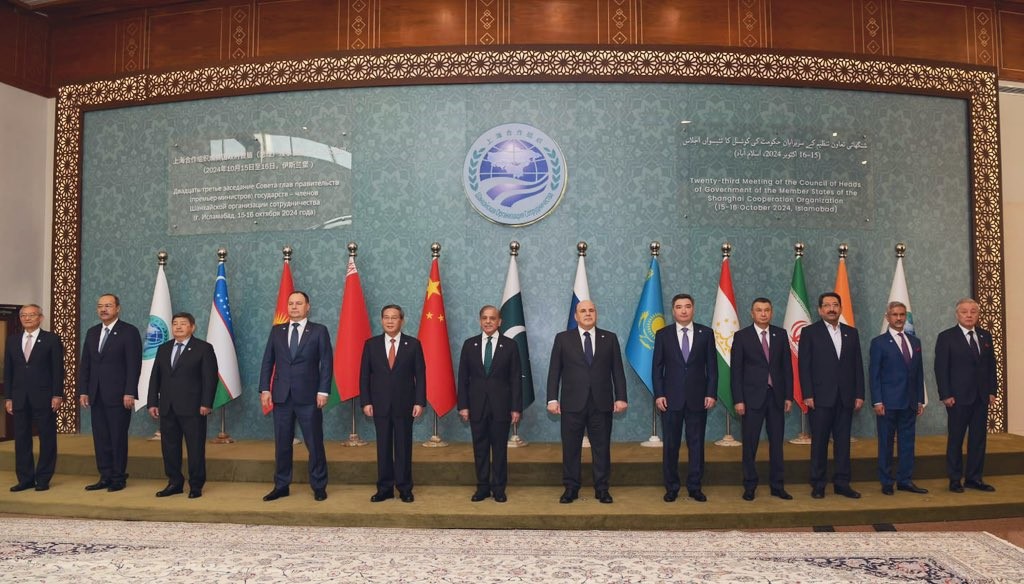In his address at a conclave of the SCO chaired by Pakistan PM and attended among others by Chinese Premier, Jaishankar asserted that trade and connectivity initiatives must recognise territorial integrity and sovereignty…reports Asian Lite News
Delivering a thinly veiled message to Pakistan from its national capital, External Affairs Minister S Jaishankar on Wednesday said if activities across borders are “characterised” by terrorism, extremism and separatism, they are hardly likely to encourage trade, energy flows and connectivity in parallel.
In his address at a conclave of the Shanghai Cooperation Organisation (SCO) chaired by Pakistan Prime Minister Shehbaz Sharif and attended among others by Chinese Premier Li Qiang, Jaishankar also asserted that trade and connectivity initiatives must recognise territorial integrity and sovereignty and it is essential to have an “honest conversation” on lack of trust.
The remarks came amid the lingering military standoff between Indian and Chinese troops in eastern Ladakh and concerns over China’s increasing military muscle-flexing in the Indian Ocean and other strategic waters.
Ahead of the SCO deliberations at the Jinnah Convention Centre, PM Sharif shook hands with Jaishankar and warmly received him for the second time in the last two days. Sharif and Jaishankar shook hands and briefly spoke at a dinner reception last night.
In his address at the conclave, Jaishankar flagged concerns over a number of challenges including that of countering the ‘three evils” of terrorism, extremism and separatism.
“If activities across borders are characterised by terrorism, extremism and separatism, they are hardly likely to encourage trade, energy flows, connectivity and people-to-people exchanges in parallel,” the external affairs minister said, without naming Pakistan.
Before leaving Islamabad, Jaishankar thanked PM Sharif and Pakistan Foreign Minister Ishaq Dar in a post on ‘X’ that is being seen as a positive gesture by senior functionaries in the Pakistan establishment.
He also described the SCO’s Council of Heads of Government meeting as “productive”.
“Departing from Islamabad. Thank PM @CMShehbaz, DPM & FM @MIshaqDar50 and the Government of Pakistan for the hospitality and courtesies,” Jaishankar said.
In another post, the external affairs minister identified eight takeaways from the Indian perspective at the conclave that included the inclusion of digital public infrastructure (DPI) and digital in the SCO framework and a decision to develop a dialogue on the idea of ‘One Earth, One Family, One Future’.
Other key takeaways listed by the minister included upholding fair and balanced connectivity projects in accordance with international law and reemphasising rules-based, non-discriminatory, open, fair, inclusive and transparent multilateral trading systems with WTO at its core.
In his remarks at the conclave, Jaishankar said cooperation must be based on mutual respect and sovereign equality and that the SCO member nations can benefit immensely if the grouping moves ahead collectively with mutual trust.
He especially stressed on adhering to the SCO charter, highlighting its underlying essence of strengthening mutual trust, friendship and good neighbourliness.
“It should recognise territorial integrity and sovereignty. It must be built on genuine partnerships, not unilateral agendas. It cannot progress if we cherry-pick global practices, especially of trade and transit,” he said, in remarks seen as an indirect reference to China’s assertive behaviour on several critical issues such as trade and connectivity.
“But most of all, our endeavours will progress only when our commitment to the Charter remains firm. It is axiomatic that development and growth requires peace and stability. And as the Charter spelt out, this means being firm and uncompromising in countering the ‘three evils’.” Jaishankar said there is a need to introspect if “good neighbourliness” is missing somewhere and there is a lack of trust.
“If we fast-forward from the inception of the charter to the situation today, these goals and these tasks are even more crucial. It is, therefore, essential that we have an honest conversation,” he said.
“If trust is lacking or cooperation inadequate if the friendship has fallen short and good neighbourliness is missing somewhere, there are surely reasons to introspect and causes to address,” he said.
“Equally, it is only when we reaffirm our commitment most sincerely to the Charter that we can fully realise the benefits of cooperation and integration that it envisages,” he added.
Jaishankar said the SCO’s objective was to strengthen mutual trust, friendship and good neighbourliness.
“It is to develop multifaceted cooperation, especially of a regional nature. It is to be a positive force in terms of balanced growth, integration and conflict prevention,” he said.
“The Charter was equally clear what the key challenges were. And these were primarily three, that the SCO was committed to combating: one, terrorism; two, separatism; and three, extremism,” he said.
Jaishankar also described the challenge of debt as a serious concern.
The external affairs minister, delving into global issues, said the global institutions need to keep pace with the changes and underlined the need for ‘reformed multilateralism’.
Jaishankar also emphasised the need for comprehensive reform of the UN Security Council, both in the permanent and non-permanent categories, to make the global body more representative, inclusive, transparent and efficient.
“The SCO must be in the lead of advocating such change, not hold back on a matter of such importance,” he said.

